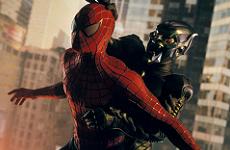
 |
| Photo © 2002 Sony Entertainment/Columbia Pictures |
| Academy Award Nominations: | |
| Best Sound: Kevin O'Connell, Greg P. Russell, and Ed Novick | |
| Best Visual Effects: John Dykstra, Scott Stokdyk, Anthony LaMolinara, and John Frazier | |
| Permalink | Home | 2002 | ABC | Blog |